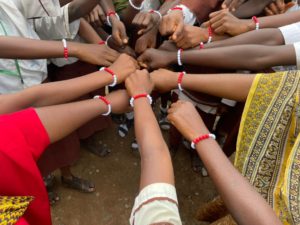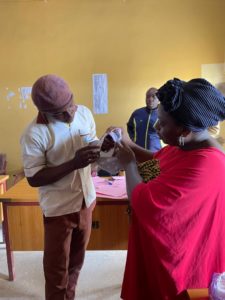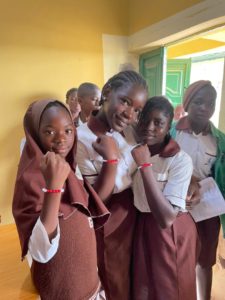Menstruation is considered a taboo across many cultures in Nigeria and several other countries in the world. Many adolescent girls had their menarche (first menstrual period) without ever learning about it or discussing with anyone how to deal with it. Imagine a young girl having her menarche unexpectedly in the class at school. She would feel embarrassed and wish the ground would swallow her up. The shame surrounding the topic limits the knowledge of many young girls on menstruation and menstrual hygiene. They often ask their female peers who also have very limited knowledge and they end up getting misled.

That is why the communication assistant from Green Habitat Initiative (GHI), Aisha Abdulhamid Yusuf, together with the project coordinator for Women in WASH F.C.T and Program officer for Waters & Dew Consult, Blessing Isa visited Junior Secondary School (JSS) Guto located at Bwari area council, Abuja, Nigeria in honour of the World Menstrual Hygiene Day (May 28, 2022). The objective of the visit was to break the silence and jinx surrounding menstrual hygiene through sensitization.

The team made sure to include both boys and girls as it is just as important for boys to be able to talk freely about menstrual hygiene and to help their female peers when needed.
The sensitization began with asking the students what they know about menstruation and menstrual health and hygiene. They seemed to know the basics like how menstruation is the monthly blood flow from the uterus to the vagina; it is a sign that a woman can give birth etc. They were also willing to learn more about what they did not know. They were lectured on the importance of menstruation and the hygienic measures to observe while menstruating. In addition, a lot of myths concerning menstrual hygiene were debunked.

Although the students were a little shy talking about menstrual hygiene at first, the team was able to create a safe and comfortable environment for them to talk openly.
Both male and female students narrated stories about their encounters relating to menstrual hygiene. A story that stuck with me was a girl in the class whose uniform got stained by her menstrual blood without her knowing. Many of her classmates laughed at her and she felt very ashamed and embarrassed after learning about it. We taught them not to laugh in such instances but rather to help her out.
The sensitization continued by showing them how to use a sanitary pad, from the process of putting on and taking it off. It started with effective handwashing procedures followed by how to properly put on a pad on clean dry underwear, and how long to keep it on before hygienically removing and discarding it. Proper underwear washing and drying techniques were also included. Volunteers from the male and female students came out to show their peers how to properly put on and remove a pad.
As a symbol to mark the day, the students were further taught how to make menstrual beads which they committed to use as conversation starters to break the silence on issues around period stigma and menstrual health while also sharing the information with their friends. This was a fun and inclusive activity as some of the students already had some interest in bead-making. They facilitated the bead-making process by helping their peers make their own beads. The students also made beads for some of their teachers and their principal.
In conclusion, the students at JSS Guto were successfully sensitized on menstrual hygiene, its importance and the proper hygiene practices to adopt during menstruation. The students were immensely grateful for the activity carried out on menstrual hygiene as this has made them comfortable to talk on the matter without feeling ashamed.

